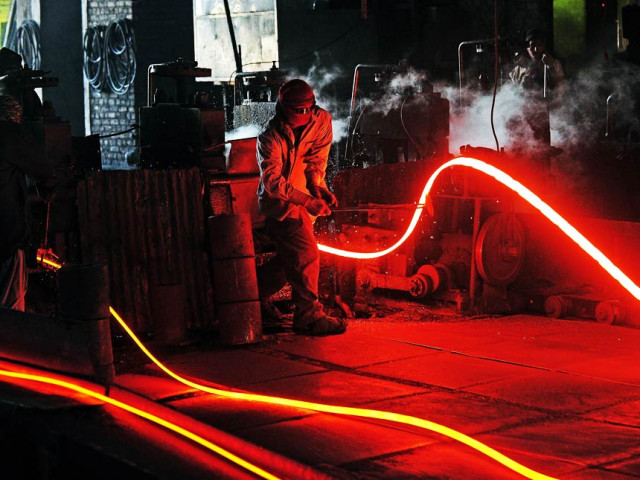Re-rolling mills increase production of steel products
Install coal gasification plants to cope with energy shortages.

The steel industry in Pakistan is dominated by small and medium-scale re-rolling mills, engaged in re-rolling, forging and arc furnace melting activities. PHOTO: AFP/FILE
Millers are gradually improving production of steel products as installation of coal gasification plants is aiding their operations, at least in Punjab, industry players say.
The steel industry in Pakistan is dominated by small and medium-scale re-rolling mills, engaged in re-rolling, forging and arc furnace melting activities. In Punjab, there are around 200 small, medium and large-scale mills, catering to the demand for steel-based products.
The demand, according to the millers, is still low and largely comes from the construction industry, which accounts for more than 50% of steel consumption.
A couple of years ago, some big mills started importing coal gasification plants from China and later some imported the technology from India to cope with the energy crisis and environmental hazards.
Since these plants are costly, costing around Rs25-30 million, and can be afforded only by a few millers, medium-scale mills are using domestic coal gasification plants, built with Chinese technology and cost around Rs4 million. Though the capacity of these plants is low, they cater to the needs of the mills.

“Steel re-rolling mills produce 85% of products from scrap, which we import and the rest is provided by the ship-breaking industry,” said Asmat Pervaiz, Chief Executive Officer of Azad Steel Re-rolling Mills, while talking to The Express Tribune.
Since Punjab mills are experiencing energy shortages, which disrupt production, the use of coal gasification plants is increasing. According to Pervaiz, around 20% of mills have installed these plants, which run on imported coal and meet the needs of small re-rolling mills.
The cost of producing finished products with these plants is 40% higher compared to gas and electricity.
“When we needed raw material from PSM mainly due to better quality, the steel mill only provided 0.4 to 0.5 million tons out of total demand for 4 million tons. However, when NAB involved re-rolling mills while probing corruption in PSM, we decided not to take raw material from PSM. Now, we do not purchase from PSM,” Pervaiz added.
Total installed capacity of steel re-rolling mills is 10 million tons, but for the last few years the demand for steel-based products has been around 4 million tons, meaning 60% of the capacity remains unutilised.
Still, the millers find it difficult to meet the demand due to energy crisis and slow economic activities.
The demand for steel-based products is expected to rise since major industries like textile, construction and engineering could receive a boost, especially after the grant of GSP Plus status to Pakistan and provision of soft loans to people for constructing their houses.
“We hope for a better future for our industry, but right now things are stagnant,” said Mian Muhammad Ashraf, Chairman of Aryan Steel Industries. “The construction industry is the only hope for us, though it is not enjoying a boom.”
Ordnance factories are another source that purchase finished products from the re-rolling mills. The fate of around 300 steel re-rolling mills depended on future development of the country, which in turn highly depended on reforms in the energy sector, Ashraf added.
Published in The Express Tribune, November 11th, 2013.
Like Business on Facebook, follow @TribuneBiz on Twitter to stay informed and join in the conversation.



















COMMENTS
Comments are moderated and generally will be posted if they are on-topic and not abusive.
For more information, please see our Comments FAQ